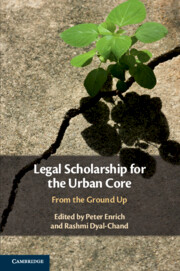Book contents
- Legal Scholarship for the Urban Core
- Legal Scholarship for the Urban Core
- Copyright page
- Contents
- Editors and Contributors
- 1 Introduction
- Part I Change on the Ground
- Part II Reimagining Law for the Urban Core
- Part III The Legal Academy and the Urban Core
- 6 Focused Ethnography
- 7 Legal Education, Democracy, and the Urban Core
- 8 Education and Social Justice
- 9 Conclusion
- Index
- References
6 - Focused Ethnography
A Methodological Approach for Engaged Legal Scholarship
from Part III - The Legal Academy and the Urban Core
Published online by Cambridge University Press: 22 June 2019
- Legal Scholarship for the Urban Core
- Legal Scholarship for the Urban Core
- Copyright page
- Contents
- Editors and Contributors
- 1 Introduction
- Part I Change on the Ground
- Part II Reimagining Law for the Urban Core
- Part III The Legal Academy and the Urban Core
- 6 Focused Ethnography
- 7 Legal Education, Democracy, and the Urban Core
- 8 Education and Social Justice
- 9 Conclusion
- Index
- References
Summary
Members of our research team produced the above in-person, ethnographic account of a child support enforcement hearing as part of our data collection plan for a qualitative study investigating the civil justice experiences of noncustodial parents in child support enforcement proceedings. The research team utilized focused ethnography as its methodological approach when conducting the court observations. Most of the parents in these cases are no- and low-income Black fathers who lack attorney representation and owe both current and past due child support, often in the thousands of dollars. We examine how their cases are handled by the judges and attorneys they encounter and how they navigate the civil process in proceedings where they face a variety of increasingly punitive enforcement measures, including civil incarceration for failure to pay support. This social phenomenon is widespread, with county jails across the United States incarcerating poor fathers who lack money to pay the support they owe (Brito, 2012).
- Type
- Chapter
- Information
- Legal Scholarship for the Urban CoreFrom the Ground Up, pp. 140Publisher: Cambridge University PressPrint publication year: 2019

